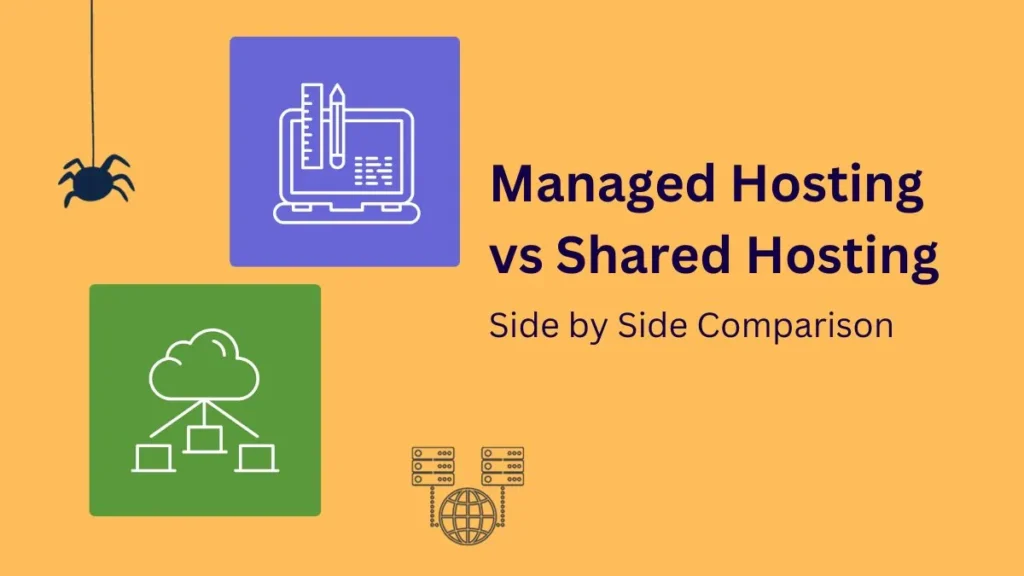Are you looking for a good web hosting plan for your website? And is there any confusion about Shared Hosting and Managed Hosting in your mind?
However, this is a common problem that many people face, not just you. And before choosing a good web hosting you must know about this.
Also if you are about to start your blogging journey, and if you select a wrong web hosting it can be a wrong decision for you.

But we will tell you all about Managed Hosting vs Shared Hosting. And this post of ours will guide you to select the right way posting between these two popular web hosting.
Read our post for two minutes and then take a decision.
Shared Hosting vs Managed Hosting Comparison
Quick comparison between Managed Hosting and Shared Hosting:
| Aspect | Managed Hosting | Shared Hosting |
|---|---|---|
| Server Management | Provider manages server setup & maintenance | Limited control, server shared among users |
| Performance | High performance, dedicated resources | Resources shared among multiple users |
| Customization | More customization options available | Limited customization due to shared setup |
| Security | Enhanced security measures | Basic security features |
| Scalability | Easily scalable, can handle traffic spikes | Limited scalability due to shared resources |
| Cost | Higher cost due to dedicated services | Lower cost, shared resources |
| Technical Support | 24/7 expert support provided | Basic support with some limitations |
| Ease of Use | May require technical expertise | User-friendly, no advanced skills needed |
| Traffic Handling | Handles high traffic more efficiently | Limited capacity during high traffic times |
| Resource Allocation | Dedicated resources for each user | Shared resources among multiple users |
| Control | More control over server configurations | Limited control over server configurations |
| Backup & Recovery | Robust backup and recovery options | Limited backup and recovery capabilities |
| Software Updates | Managed by provider, often automatic | Users responsible for software updates |
| Uptime Guarantee | Higher uptime guarantee | Variable uptime based on server load |
| Suitable For | Businesses, high-traffic websites | Personal websites, small businesses |
Shared Hosting Overview
Shared Hosting is one of the most basic web hosting plans, in which server resources are shared with other websites. And that’s why the cost of Shared Hosting is very low. Also some hosting companies offer their users the option to install unlimited sites without any restrictions on bandwidth and storage.
And since it is available cheaply, these facilities also provide a great service to the users, but you have to compromise on performance.
So in my opinion Shared Web Hosting can be a perfect option for those who have just started a blog and taken the first step in the blogging journey. But once your website traffic increases you can update your web hosting plan as per your needs.
Pros and Cons of Shared Hosting
Pros:
- Cost-effective: Shared hosting is usually more affordable as the resources (server, bandwidth, etc.) are shared among multiple users.
- Ease of use: Setup and maintenance are typically managed by the hosting provider, making it easy for beginners to get started.
- Technical maintenance: Server updates, security patches, and backups are often handled by the hosting company.
- Scalability: Most shared hosting plans allow for easy upgrades if your website needs more resources.
Cons:
- Limited resources: As resources are shared, high traffic or resource-intensive websites hosted on the same server can affect your site’s performance.
- Less control: Limited customization and control over server configurations compared to managed hosting.
- Security concerns: Security vulnerabilities in other websites on the same server can potentially affect your site.
- Performance issues: Slower loading times or occasional downtimes might occur during peak traffic times.
Managed Hosting Overview
Managed Hosting is a wave hosting plan where users outsource technical work as well as server maintenance to hosting engineers. The primary job of an engineer, especially with all these hostings, is to ensure that your website’s performance is always up to the mark.
In case of Managed Hosting, you don’t have to perform manual backup, Apps upgrade, Malware Scanning, CDN Configuration, Firewall Setup, Server maintenance, Security check, etc.
All these web hosting provide a secure environment. All the additional benefits that users will get from here are performance boost, dedicated server resources, dedicated experts that stay forever, and advanced security features, etc.
Managed Hosting is suitable for you when high performance is your priority, when you don’t want to be involved in the maintenance of your website and you always need an expert engineer on your side.
Pros and Cons of Managed Hosting
Pros:
- High performance: Dedicated resources ensure better performance, as the server is optimized for your specific website.
- Enhanced security: Managed hosting often includes robust security measures, regular updates, and dedicated support to address security concerns.
- Greater control: More control over server configurations, allowing for customization based on your website’s specific needs.
- Scalability and flexibility: Easy scalability to accommodate growth and changes in website traffic and requirements.
Cons:
- Cost: Managed hosting tends to be more expensive due to the dedicated resources and additional services provided.
- Technical knowledge required: While the provider manages the server, some technical knowledge might be necessary for certain configurations or troubleshooting.
- Dependency on provider: Reliance on the hosting provider’s expertise and support can sometimes lead to delays in problem resolution.
Managed Hosting vs Shared Hosting FAQs
What is Shared Hosting?
Shared Hosting involves hosting multiple websites on a single server. Resources like CPU, RAM, and disk space are shared among multiple users, making it cost-effective for smaller websites.
Who is Shared Hosting suitable for?
It’s ideal for individuals, small businesses, or websites with low to moderate traffic. If you’re starting out or have a budget constraint, shared hosting can be a good choice.
What are the advantages of Shared Hosting?
Cost-effective: Shared hosting plans are generally cheaper.
User-friendly: Simplified management, often with a user-friendly control panel.
Maintenance: The hosting provider manages server maintenance tasks.
What are the drawbacks of Shared Hosting?
Limited resources: Resources are shared, so performance might be affected by other websites on the server.
Security concerns: Security risks due to other users on the same server.
How scalable is Shared Hosting?
Shared hosting may have limitations in terms of scalability. It might not handle sudden spikes in traffic or resource demands as effectively as other hosting options.
What is Managed Hosting?
Managed Hosting involves a hosting provider taking care of the technical aspects of server management, allowing users to focus on their website content and business. It’s typically more comprehensive and hands-off than shared hosting.
Who is Managed Hosting suitable for?
It’s beneficial for businesses or individuals who require high performance, security, and technical support but lack the expertise or time to manage server-related tasks.
What are the advantages of Managed Hosting?
High performance: Dedicated resources ensure better performance for your website.
Enhanced security: Providers often implement robust security measures.
Technical support: Expert assistance is available for server-related issues.
What are the drawbacks of Managed Hosting?
Higher cost: Managed hosting plans are generally more expensive due to dedicated resources and additional services.
Less control: Users might have limited access to server settings or configurations.
How scalable is Managed Hosting?
Managed hosting often offers more scalability options than shared hosting. Providers can often accommodate increased traffic and resource demands more effectively.
Final Word
Choosing between shared hosting and managed hosting ultimately depends on your specific needs and level of technical expertise. Shared hosting offers affordability and simplicity, making it suitable for beginners or those with basic website requirements. On the other hand, managed hosting provides a higher level of support, security, and performance optimization, making it ideal for businesses or individuals who prioritize reliability and scalability without the hassle of managing technical aspects.
Before making a decision, consider factors such as budget, website complexity, traffic volume, and the level of control and customization you desire. Both options have their pros and cons, so it’s essential to assess your priorities and choose the hosting solution that aligns best with your goals.




